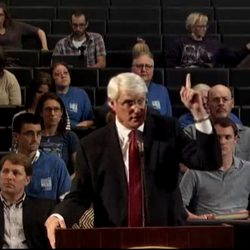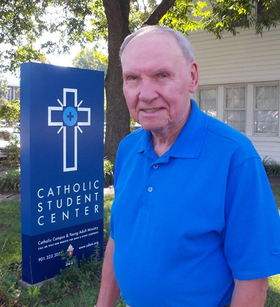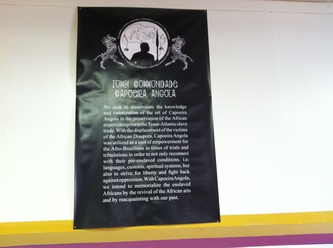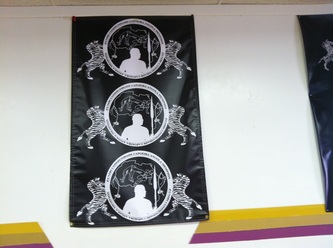Susan Price steps down to the sidewalk near Central and Patterson from a city bus running 20 minutes behind schedule.
"I happen to be from southern California," she explains on her way to class. "Having grown up in the big city, I'm used to having public transportation. Although I have to admit that when I moved to Memphis about a year ago, I realized that the bus system here was not the best."
Instead of just complaining, Price seized an opportunity to work toward improving service and joined the Memphis Bus Riders Union last year. A fellow passenger told her the route she was using was about to be cut.
"Somebody got on the bus saying they were going to cut out the Five Central, which services the campus from downtown," she said. "They were passing out handbills."The flyer she read that day eventually led her to meetings of the Memphis City Council and the Memphis Area Transit Authority Board of Commissioners.
"They (the Bus Riders Union) raised the consciousness about the bus system here in Memphis," Price claims. "They went to the city council meetings and encouraged them to fund the bus system. They went to the commissioners for MATA and encouraged them use the funds they receive from the city of Memphis to make the bus system better."
Her group did have some success in staving off budget cuts and the elimination of some routes. However, she sees funding as a major hurdle that must be overcome before the system attracts more riders.
"Memphis doesn't have really bad congestion like cities in southern California," Price pointed out. "More people would ride the bus if the system was better, and it used to be much better than it is now. The bus system is not getting the public funds that they have gotten in the past.”
Price, who states her age as "over 50," studies business at the University of Memphis. She talked about recent budget cuts, government sequestration and the effect it has on the population served by public transportation. Some of the stories fellow bus riders told in the public meetings were heart wrenching, she said.
"Some of them were just pouring out their hearts to the commissioners," Price remembered. “Transportation is one of those things like housing and food. In this economy a lot of people are falling to the bottom. The safety net has sprung some leaks. If you don't have a good transportation system in your city, you're going to have a population of people who can't get to those jobs that are marginal at best."
Joyce Martin expresses even harsher criticism of MATA. Waiting at her stop on Park Avenue, her arm bandaged from that morning's plasma donation at the center across the street, she vents her frustration.
"I'm not happy with the services,” Martin said. "They've changed the routes, they've cut some of the bus routes – I'm not satisfied."
The Willet Street resident said she lived on disability payments and that life was even harder without dependable transportation.
"It's hard to get from one place to another because the buses are always late, " she fumed.
On the opposite side of Park Avenue, Misty Gray stared down the street waiting for her eastbound bus. She pulled a wheeled cart that she hoped to fill with items from the shopping trip she had planned.
"The bus is not dependable," she said. "The schedule is not adhered to and they are usually late."
Gray added that it could be particularly aggravating when trying to get groceries back to her home on Stuart Road.
"Sometimes when I've been grocery shopping," she said, "my frozen food and perishables start to thaw while I'm waiting on the bus."
Despite criticism of MATA by some of those it serves, Joy Rogers Stout, Director of Adult Commuter Student Services at the U of M, thinks many commuters could benefit from utilizing public buses.
“I do see bus transportation as a viable alternative for commuters who live in areas where bus stops are convenient,” she said. “This mode of transportation is capable of being a successful alternative because it is an economical way to get to a lot of places in our city if you do not have a car or any other means of transportation.”
She added that even those who owned a car might could save on gas and eliminate the stress that comes with driving in heavy traffic.
Near Stout’s office in the University Center is a rack of schedules and route sheets offered by MATA. Her department also provides information to parents and new students during orientation, and she pointed out that MATA representatives participate in the “Transportation, Car Care and Safety Expo” held during their annual Commuter Student Appreciation Week.”
Still, she recognizes why some might be hesitant to avail themselves of public transportation.
“I think that students would be reluctant to use MATA bus services because of the limited bus stop locations and the amount of time that it takes to get from point A to point B, due to the intermittent stops along the way,” Stout admitted.
She said that predetermined attitudes and cultural behaviors that are associated with riding the bus might dictate some reluctance to using public bus transportation.
The perception that bus riders may not be able to afford a car was echoed by José Meza who, from his vantage point working the desk at the University Information Center near Richardson Towers, has a good view of the bus stop near Central and Patterson.
“My shift is from 7:30 a.m. until about 10 a.m.,” said Meza, a freshman. “ I see a few stops and four to six people get off at a time. I see all ages and ethnicities, but some of the people might not be financially able to have a car, and that’s a big deal I think.”
Meza also speculated that some of the bus riders might not want to deal with parking on campus.
Parking is definitely an issue for freshman Rebekah Davis who commutes from Lakeland.
“I have to leave for classes two hours early if I want to get a spot on Central on Mondays, Wednesdays and Fridays,” she said.
Even with the early wake-up, Davis will continue to drive herself to the University.
“I do not consider public transportation an option,” she said, “because it’s sketchy.”
Despite its drawbacks, Susan Price will deal with whatever problems public transportation brings.
“That doesn't deter me,” she said. “That just means that I have to make it work for me because I use public transportation. I'm different in that way because most people would try to just save up and get a car. No, I believe public transportation should be good in every city. It's just a matter of time before the people of Memphis realize that they have to invest in that.”






 RSS Feed
RSS Feed